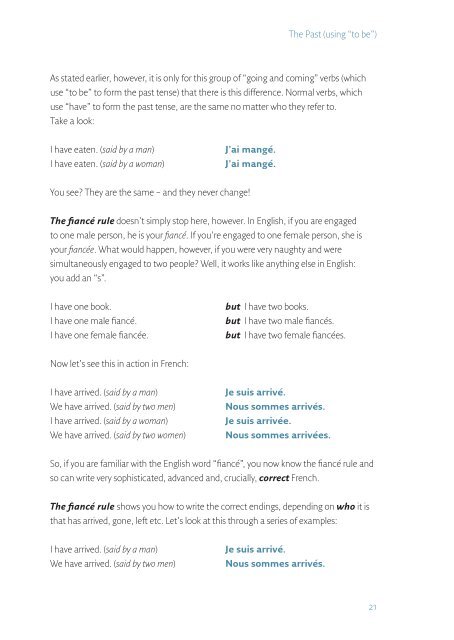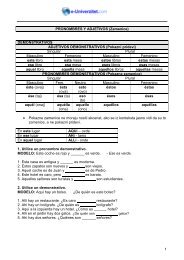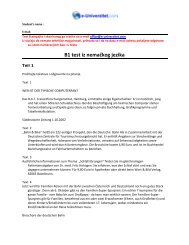Collins Paul Noble French booklet.pdf - Centar za edukaciju i ...
Collins Paul Noble French booklet.pdf - Centar za edukaciju i ...
Collins Paul Noble French booklet.pdf - Centar za edukaciju i ...
You also want an ePaper? Increase the reach of your titles
YUMPU automatically turns print PDFs into web optimized ePapers that Google loves.
The Past (using “to be”)<br />
As stated earlier, however, it is only for this group of “going and coming” verbs (which<br />
use “to be” to form the past tense) that there is this difference. Normal verbs, which<br />
use “have” to form the past tense, are the same no matter who they refer to.<br />
Take a look:<br />
I have eaten. (said by a man) J’ai mangé.<br />
I have eaten. (said by a woman) J’ai mangé.<br />
You see? They are the same – and they never change!<br />
The fi ancé rule doesn’t simply stop here, however. In English, if you are engaged<br />
to one male person, he is your fi ancé. If you’re engaged to one female person, she is<br />
your fi ancée. What would happen, however, if you were very naughty and were<br />
simultaneously engaged to two people? Well, it works like anything else in English:<br />
you add an “s”.<br />
I have one book. but I have two books.<br />
I have one male fi ancé. but I have two male fi ancés.<br />
I have one female fi ancée. but I have two female fi ancées.<br />
Now let’s see this in action in <strong>French</strong>:<br />
I have arrived. (said by a man) Je suis arrivé.<br />
We have arrived. (said by two men) Nous sommes arrivés.<br />
I have arrived. (said by a woman) Je suis arrivée.<br />
We have arrived. (said by two women) Nous sommes arrivées.<br />
So, if you are familiar with the English word “fi ancé”, you now know the fi ancé rule and<br />
so can write very sophisticated, advanced and, crucially, correct <strong>French</strong>.<br />
The fi ancé rule shows you how to write the correct endings, depending on who it is<br />
that has arrived, gone, left etc. Let’s look at this through a series of examples:<br />
I have arrived. (said by a man) Je suis arrivé.<br />
We have arrived. (said by two men) Nous sommes arrivés.<br />
21









